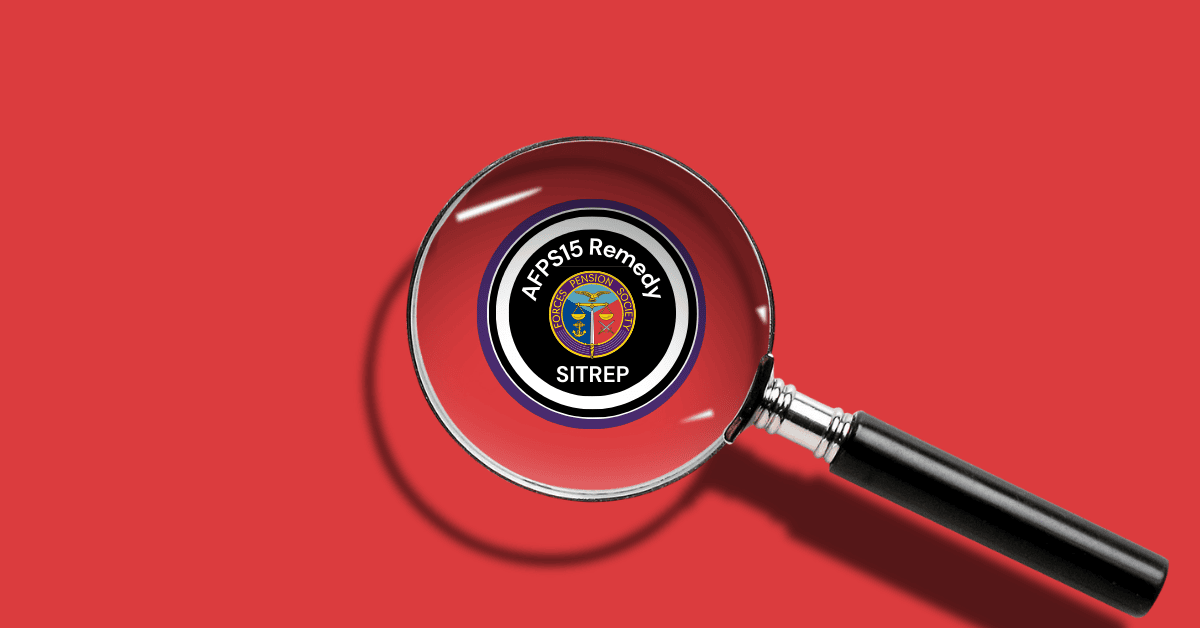
Yesterday’s article outlining the Government response to the consultation regarding the Cost Control Mechanism (CCM) provoked a number of comments that the subject was too complicated and that the implications were not understood.
The subject is extremely complex but we have decided to provide this follow up article to address some of your concerns : –
Who is affected by the CCM?
The CCM was introduced as part of the 2015 overhaul of public sector pension schemes, here we will focus only on AFPS impact.
The first point to note is that the CCM is unique (in AFPS terms) to AFPS15. Moreover, existing benefits are not affected by the proposed changes.
Consequently, this concerns Serving Personnel (SP) that will accrue AFPS15 benefits in the future (ie all personnel serving post 01/04/2022).
What is the CCM?
We have discussed the CCM in previous newsletters and social media articles. When AFPS15 was introduced, part of the legislation included the creation of the CCM.
The CCM assesses certain, agreed, elements of the costs of the AFPS15 scheme. If those assessed costs decrease/increased by more than 2% of pensionable pay compared to their original level, then member benefits are increased/reduced to bring the assessed costs back to the original level.
In AFPS15 terms this means that if the assessed costs rise by more than 2% then the future benefit accrual rate can be reduced. Equally if the assessed costs fall then the accrual rate will be improved.
How might this affect me?
Since its introduction, AFPS15 has enjoyed an accrual rate of 1/47h of reckonable salary. This means that in each year served since 01/04/2015, participating members have secured additional pension rights of 1/47th x their salary. Those benefits are secure. Any adjustments caused by the CCM will impact future accrual rates. As identified above, the future benefits could improve, or they could get worse.
Why does the Government want to change the CCM?
The purpose of the CCM was to protect the taxpayer from excessive increases in assessed costs (by reducing the AFPS15 accrual rate). It was also designed to ensure that if the assessed costs fell by more than 2% that the accrual rate would improve.
The Government Actuary in his review of the CCM identified that the original scheme had the following shortcomings: –
First it was noted that the existing CCM included assessed costs related to certain legacy scheme (AFPS75 and AFPS05) issues albeit that the CCM results would only impact AFPS15 membership.
The Government has therefore decided to ensure that in future the CCM includes only AFPS15 assessed costs.
Next it was noted that the +/- 2% margin would likely lead to the need for frequent adjustments of the AFPS15 accrual rates, to bring assessed costs back to the original level. This is undesirable as it makes it difficult to forecast future AFPS15 benefits By widening the margin to +/-3% the Government hopes to improve the stability of the system.
Finally, the Government has determined that, it does not seem possible for the CCM to be able to protect taxpayers unless it takes into account more of the factors affecting the actual cost of providing a pension. As a result, it has advised that a breach of the (new) +/- 3% margin will only trigger benefits adjustments (either way, up or down) if the breach would have occurred had the wider factors been included. Note that these additional factors cannot create a breach where none existed before, they are simply a validation check to moderate results of the core CCM.
What does FPS think?
We feel that the first two changes above are sensible. They promise to give more stability to the rate of AFPS15 accrual, and they recognise that AFPS15 members benefits should not be influenced by AFPS75 or AFPS05 issues.
We don’t believe that the further validation check is needed if the first two changes are implemented, and we feel that adding this “validation check” breaks the terms (and spirit) of the agreements made with public sector unions when the CCM was introduced.
We hope that this article sheds a little more light on the complex subject that is the “cost control mechanism”, but our key message is that benefits earned to date are unaffected.
If you are a Member of the Society and have questions about this topic please contact us via pensionenquiries@forpen.co.uk. If you’re not a Member and wish to ask further questions you can join us here




